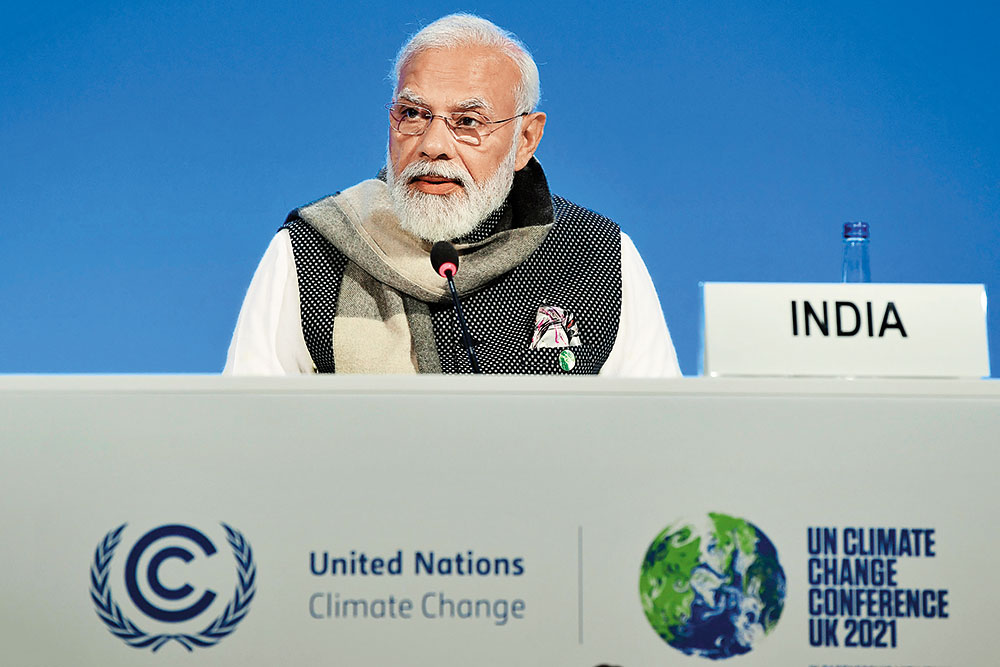LiFE, or Lifestyle for Environment, is a concept which was first articulated by Prime Minister Narendra Modi at COP26, the Conference of the Parties on climate change, in Glasgow in 2021. Introducing the term, he said: “This One Word, in the context of climate, can become the basic foundation of One World. Today there is a need for all of us to come together, with collective participation, to take LiFE forward as a campaign. What is needed today is mindful and deliberate utilization, instead of mindless and destructive consumption.”
While broader environmental compulsions guided the prime minister’s commentary, the urgent crisis represented by global warming was clearly a key consideration at Glasgow. LiFE spoke directly to the position India has consistently taken on climate justice and per capita equity when seeking to control climate change-inducing carbon emissions. It offered a way to move all humankind towards a universally accepted set of consumption practices that ultimately ushers in a circular global economy.
During its presidency of the G20, India seeks to champion this idea and bring it into the frequently used vocabulary of the international community. At its heart, LiFE represents the perspective that every human life matters, and every section of society needs to be included in seeking solutions for climate change. Looking ahead, perhaps the most important voice that needs to be heard in the discourse on climate change in India is that of India’s women.
Women in Indian Society
Statistics would suggest that the voice of Indian women may currently be relatively subdued. India ranks 164th among 176 countries in female workforce participation at around 24%. Even societies with relatively weak empowerment of women, such as Saudi Arabia, rank higher than India on their female workforce participation ratio. The multiple challenges that women in India face include early drop-out from school, gender-based discrimination, limited access to resources and services and land ownership constraints. Studies indicate that the world over, women are disproportionately affected by climate change, with one UN study suggesting that women make up 80% of the population displaced by environmental disruption. Indian women, particularly in rural areas, are often responsible for securing food and water for their families as primary caregivers, making them even more vulnerable to the drastic impacts of climate change.
Ironically, as a survey by the World Economic Forum in 2021 showed, women outscore men on most leadership qualities, and their management style favours long-term thinking, transparency and inclusion, all of which are necessary skills for pioneering climate change alleviation and sustainable innovation. A recent study conducted by the UN in rural areas suggests that when provided with the same access to resources as men, women farmers could increase agricultural yields by 20% to 30%. An analysis by the World Economic Forum in 2020 found that gender equality was positively correlated with lower greenhouse gas emissions, higher forest cover and greater use of renewable energy.
Consequently, empowering women with equal opportunities should be high on the agenda of a collective effort to deal with climate change while generating economic growth in India.
The G20 Advantage
The good news is that we already have several women role models in India helping to transform the sustainability landscape. From women farmers adopting new techniques in agriculture to women entrepreneurs deploying multiple innovations, there are a number of successes that inspire us.
Rajkumari Devi, a farmer from Bihar, has been promoting climate-smart agriculture through intercropping, mixed cropping and crop rotation in her community. Her efforts inspired over 200 farmers in her village to adopt crop diversification practices, leading to an increase in crop yields and income. Sabarmati Tiki, a farmer and environmental activist from Odisha, is well known in the region for promoting biodiversity conservation. Thanks to her, over 3,000 farmers in the neighbouring areas chose to adopt organic farming practices and gave up the use of chemical pesticides. Anjali Devi, a farmer from Telangana, deployed a biogas plant powered by cow dung on her property, reducing her overall carbon footprint while saving around Rs 8,000 every month in cooking fuel costs. Chhavi Rajawat, the youngest ever woman sarpanch of Soda village in Rajasthan, worked to improve access to clean water, sanitation and education for the villagers, and converted her village to 100% solar-powered.
Beyond the efforts of these individuals and many more, a number of organisations have also emerged to support the cause of women, such as, in the climate-smart agriculture space, entities like the Mahila Kisan Sashaktikaran Pariyojana and Vanastree, which are working towards promoting women empowerment along with biodiversity conservation by capacity-building training and fair inclusion in the decision-making process. Non-profits, such as the Center for Water and Sanitation, Mahila Housing Trust and Watershed Organization Trust, to name a few, are also actively promoting gender equality in areas such as waste management, climate change adaptation and water harvesting.
India’s G20 presidency this year puts the country in a unique position to influence the international community by sharing learnings drawn from its own experiences. The G20 summit can serve as a global platform for disseminating important information to educate and raise awareness about the relevance of women’s empowerment to broader socio-economic development. Such a broad platform can accelerate the pathway to an equitable society, eventually leading to improved outcomes on climate change for the G20 countries and beyond, hence the reinforcement of this message by the prime minister at the G20 Development Ministers’ meeting this month. In his words, “Women are setting the agenda for development and are also the agents of growth and change. I urge you to adopt a game-changing action plan for women-led development.”
With input from Shail Vani and Simran Phatak
Mukund Rajan is chairperson, ECube Investment Advisors











